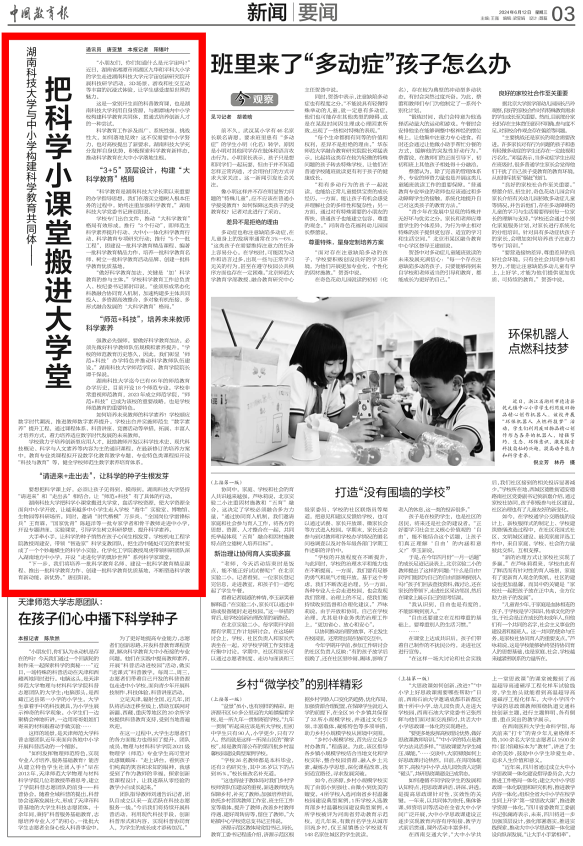
Recently, students from Jiuhua Heping Ke Da Primary School, a previously affiliated school of HNUST, conducted science and technology research activities in Metaverse Innovation Research & Development Institute of HNUST. This marks HNUST's effort of constructing a community of shared scientific education with middle and primary schools in Xiangtan, promoting the implementation of scientific education initiatives.
HNUST is committed to facilitating scientific education in universities, middle, and primary schools by leveraging its strengths. It will proceed as follows:
Firstly, under the guidance of scientific education, HNUST will implement "three plus five" strategy to construct "big science" landscape. The strategy consists of three key actions: enhancing the scientific literacy of prospective teachers, integrating scientific education across universities, middle, and primary schools, and conducing specialized research in scientific education. Additionally, there are five batches of projects: developing high-quality scientific education courses, creating a collection of exemplary educational materials, cultivating a group of renowned science educators, establishing brands for scientific education activities, and building high-quality bases for scientific education.
Guo Shiyin, Chief Director of scientific education activities and Secretary of Discipline Inspection Commission of HNUST, pointed out that HNUST needs to develop cooperative education with normalized science-education integration and re-utilize resources to achieve the integrated development in various forms.
Secondly, HNUST will advance “teacher training plus science and technology” mode to enhance the scientific literacy of prospective teachers, which, according to Tan Qianbao, Dean of Normal College and Education College of HNUST, is essential to facilitate the development of scientific education in universities, middle, and primary schools.
To promote the integration of science and technology into teacher training, HNUST has issued and implemented "Project for the Improvement of Digital Literacy". The project aims to cultivate teachers for the digital age through various means including curriculum development, lectures and contests. Meanwhile, HNUST is devoted to fostering innovative applied talents and encouraging teachers to develop general education courses on topics such as the history of science, introduction to modern science and technology, and science and humanity. As part of the revised education plan, HNUST is proposing to introduce courses on digitalized education teaching in the education major and select speciality majors, respectively, to complete the comprehensive system for cultivating digital literacy among teacher training students.
Thirdly, HNUST will adhere to the initiative of "Bringing in plus Going out," which means bringing science workshops into university to make resources in HNUST available to middle and primary schools, as well as inviting experts and distinguished teachers to these schools. For instance, the university has invited individuals like Wan Buyan, a role model for the times; Wang Yulin, a national role model for emulating Lei Feng's work ethics; and Chen Chaoyang, a national excellent youth, to give themed lectures and conduct hands-on experiments in middle and primary schools. The goal is to inspire students to explore their scientific interests and develop their scientific literacy.
This strategy has yielded fruitful results. Led by Professor Zhou Jianan, from the School of Mechanical and Electrical Engineering, a volunteer team has transformed everywhere materials into engaging science experiments. Meanwhile, Professor Zhou Hu, from the School of Chemistry and Chemical Engineering, has led his team to conduct a series of chemistry classes in middle and primary schools across Hunan, inspiring students to explore the wonders of chemistry.
Tang Yayang, Secretary of Party Committee of HNUST, mentioned that HNUST will focus on developing high-quality courses, compiling exceptional educational content, training outstanding science educators, and building a strong reputation for scientific education. This will enable the university to revitalize and strengthen its scientific education.
(Translated by CHEN Na and LI Siyang)